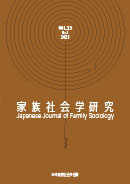Volume 33, Issue 2
Displaying 1-23 of 23 articles from this issue
- |<
- <
- 1
- >
- >|
Essay
-
2021 Volume 33 Issue 2 Pages 89
Published: October 31, 2021
Released on J-STAGE: November 17, 2021
Download PDF (171K)
Articles
-
2021 Volume 33 Issue 2 Pages 91-103
Published: October 31, 2021
Released on J-STAGE: November 17, 2021
Download PDF (367K) -
2021 Volume 33 Issue 2 Pages 104-116
Published: October 31, 2021
Released on J-STAGE: November 17, 2021
Download PDF (462K) -
2021 Volume 33 Issue 2 Pages 117-129
Published: October 31, 2021
Released on J-STAGE: November 17, 2021
Download PDF (344K) -
2021 Volume 33 Issue 2 Pages 130-143
Published: October 31, 2021
Released on J-STAGE: November 17, 2021
Download PDF (437K) -
2021 Volume 33 Issue 2 Pages 144-156
Published: October 31, 2021
Released on J-STAGE: November 17, 2021
Download PDF (371K) -
2021 Volume 33 Issue 2 Pages 157-170
Published: October 31, 2021
Released on J-STAGE: November 17, 2021
Download PDF (248K)
Special Issues Exploring Family and Labor under Industrial and Regional Transformation: New Directions in Family Studies
-
2021 Volume 33 Issue 2 Pages 171-176
Published: October 31, 2021
Released on J-STAGE: November 17, 2021
Download PDF (270K) -
2021 Volume 33 Issue 2 Pages 177-182
Published: October 31, 2021
Released on J-STAGE: November 17, 2021
Download PDF (368K) -
2021 Volume 33 Issue 2 Pages 183-193
Published: October 31, 2021
Released on J-STAGE: November 17, 2021
Download PDF (611K) -
2021 Volume 33 Issue 2 Pages 194-203
Published: October 31, 2021
Released on J-STAGE: November 17, 2021
Download PDF (657K) -
2021 Volume 33 Issue 2 Pages 204-211
Published: October 31, 2021
Released on J-STAGE: November 17, 2021
Download PDF (328K) -
2021 Volume 33 Issue 2 Pages 212-222
Published: October 31, 2021
Released on J-STAGE: November 17, 2021
Download PDF (385K)
NFRJ Corner
-
2021 Volume 33 Issue 2 Pages 223-228
Published: October 31, 2021
Released on J-STAGE: November 17, 2021
Download PDF (268K) -
2021 Volume 33 Issue 2 Pages 229-234
Published: October 31, 2021
Released on J-STAGE: November 17, 2021
Download PDF (308K)
Book Reviews
-
2021 Volume 33 Issue 2 Pages 235-236
Published: October 31, 2021
Released on J-STAGE: November 17, 2021
Download PDF (164K) -
2021 Volume 33 Issue 2 Pages 237-238
Published: October 31, 2021
Released on J-STAGE: November 17, 2021
Download PDF (152K)
Book Reviews
-
2021 Volume 33 Issue 2 Pages 239
Published: October 31, 2021
Released on J-STAGE: November 17, 2021
Download PDF (142K) -
2021 Volume 33 Issue 2 Pages 240
Published: October 31, 2021
Released on J-STAGE: November 17, 2021
Download PDF (140K) -
2021 Volume 33 Issue 2 Pages 241
Published: October 31, 2021
Released on J-STAGE: November 17, 2021
Download PDF (127K) -
2021 Volume 33 Issue 2 Pages 242
Published: October 31, 2021
Released on J-STAGE: November 17, 2021
Download PDF (137K) -
2021 Volume 33 Issue 2 Pages 243
Published: October 31, 2021
Released on J-STAGE: November 17, 2021
Download PDF (136K) -
2021 Volume 33 Issue 2 Pages 244
Published: October 31, 2021
Released on J-STAGE: November 17, 2021
Download PDF (123K)
- |<
- <
- 1
- >
- >|
